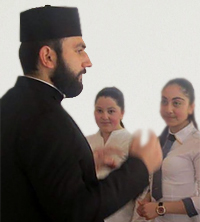
After independence, the Armenian Apostolic Church tries to increase its role in public life. In the Soviet period, the church was forced out of public life, but today the church has been able to revive its presence in different spheres.
Religious ordinances and rituals become an inseparable part of public life: funerals, baptism, wedding ceremonies etc, when the participation of clergy is becoming a lawful regularity. However, the main target of the church is education. The Church has directly accessed schools and kindergartens, tries to ensure its presence in universities and science as well.
The period of the former authorities can be called a period of consolidation of influence of the Armenian Church, but after the April’s change of power the situation has changed. The new government is not inclined to rely on the church, and continue to contribute to the expansion of church influence.
Particularly, in recent years, the blessings of the teachers at the Mother See have become traditional, with mandatory participation from the Ministry of Education. This year they did not participate in the blessing ceremony, and prior to that, the current members of the ministry’s leadership stated that the subject of “Armenian Church History” is problematic and changed must be made in that direction, focusing not on the Armenian Church but on the history of religions and in the future they will take concrete steps.
And why is it so important for the Church to participate in the field of education? The answer is clear: for centuries the education field has been the main tool for spreading its influence, as well as the main platform for its propagation. This phenomenon is characteristic not only of the Armenian Church.
Laicism
Laicism (Greek: λαός – folk, Latin, laicus – non-ecclesiastical, illiterate French, Laïcité – secular, non-religious).
The ideology of laicism has become the standard of secularism by the experience of the French. The French are still trying to preserve their secular state, and the state does not intervene in religious issues, nor does it allow religious organizations to intervene in state and public life.
For the first time, the church was completely separated from the state in France by the Law on the Separation of the Church from December 9, 1905. The adoption of the law was initiated by the leftist government, led by Lui Emil Comba.
Transition to the complete secularization was carried out in the period 1905-1906. Aristide Brian was the ideologist of that process. After a year of the adoption of this law, the government had had to resign as a result of protests, but the law has remaied in force, and France serves as an example for many countries where the secularization process is being successfully implemented.
Basic Principles
· Every citizen has the right to work without mentioning his or her own religious views.
. The French Republic is no longer funding any religious organization.
· Despite the objections by the Pope Pius X, the church property is handed over to various assemblies and associations of believers.
· In accordance with the law adopted in 1908, numerous buildings belonging to the French spiritual heritage were handed over to the state, and the church received the right to manage them indefinitely and unconditionally.
Particularly a great blow to the Church was the expulsion from general education, which is now a subject of debate and dispute.
So far France is considered to be the most secular country whose example was once infectious for the Soviet Union, Kemalist Turkey and many other countries.
Laicism played a major role in the separation of church and state and the establishment of secular education, freedom of religion, thought and conscience.
But nowadays serious developments are taking place in this regard, which are linked to a number of circumstances, including the increase in the number of Muslim immigrants in Europe, which requires new solutions.
In Armenia, secularism is also questioned by the church and the former authorities, with the permission of which the church has entered the educational system, armed forces, and so on. A number of anti-constitutional articles have appeared in laws, such as the law on the work at the law enforcement institutions and the service in the armed forces, which is only for members of the Armenian Church, whereas it has become forbidden for members of other religious organizations.
Does the new government have a clear position on this issue and is ready to make Armenia a secular country, only the time will show.